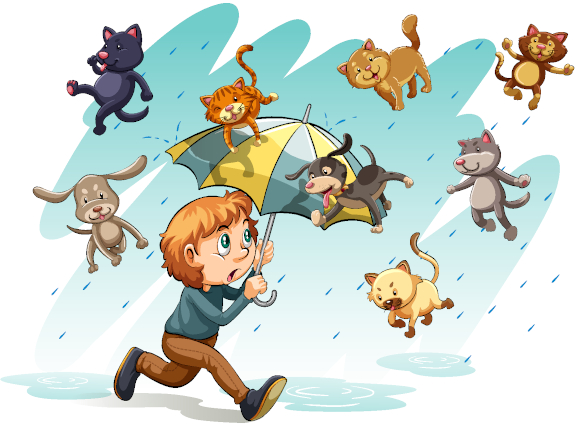English is delightfully quirky. Indeed, here are some fun facts about the English language to use as a base for classroom activities with intermediate and advanced learners.
Fact One: English changes all the time
Languages evolve, and English is no exception. For instance, the Oxford dictionary has classed one-quarter of the words as obsolete. Strewth! That only leaves about 175,000 for everyday conversation.
Fact Two: Foreigners can find English hard to understand
For this next section, you might need a good slang dictionary. English is enriched by slang, which is colourful and fun, although not everyone’s cup of tea. Indeed, one would endeavour not to use it in the presence of the Queen.

I was down the pub having some nosh when I noticed this nutter going in and out of the loo. I said to my mate: “Bet you a tenner there’s something well dodgy going on there.” “I should mind your beeswax” he replied, “I’m off to Bedfordshire.” Just as the nutter was going back into the loo, Bob’s your uncle, the Fuzz arrived.
Gobsmacked, my mate fell off his stool (actually, I think he was plastered). “Keep your hair on,” I said. “The coppers are here for him, not you.”
As a classroom activity, work on different paragraphs like the one above in small groups and provide a translation in proper English!
Classroom activities
For a classroom activity, let students guess and rewrite this passage, then read out their version to the class. Next, everyone can vote for the funniest rendition, the best, or the most imaginative.
Next, let students use dictionaries to work out the text’s true meaning and share their findings.
Less radical than slang for the English language classroom are metaphors and similes. The English are champions for quirky metaphors. For example, the French say it’s raining ropes, the Spanish say it’s raining jugs, and the Italians say it’s raining like a shower. All of those give an excellent visual of heavy rain. The English, however, say it’s raining cats and dogs. Where did they come from?
To have fun working with metaphors, try Call my bluff definitions, a fun language game to help expand a student’s knowledge of English. Check the resource box below the blog for a link to language learning activities.
Fact Three: It gets worse; even native speakers can find English hard to understand
Rhyming Slang
If slang wasn’t enough, the English language has further ways to confuse the intrepid learner. While French has ‘Verlan’, where words are said backwards, so femme becomes meuf, English has rhyming slang, a language understood by some East Londoners and a few other people in the know! If you don’t want to die stupid, use your loaf and take a butcher’s at Wikipedia, where rhyming slang is explained in full.

A rhyming word replaces the original one, so wife becomes trouble and strife. The longer phrase is then shortened to just the first word, so wife becomes trouble. The phone is the dog and bone, and that in turn becomes the dog. So if you plan to spend longer than planned down the pub, for Pete’s sake, get your trouble on the dog and let her know!
Fact Four: Much of English is foreign anyway.
The English Language is an eclectic mix of Indo-European, old Norse, Greek, Latin, German, French (and other sources). Many everyday words come from afar, such as jodhpurs after the Indian city, chocolate from Aztec, anorak from Eskimo, aficionado from French, embargo from Spanish, and so on. To this day, new words are added from diverse sources and goodness only kwz what will happen to txt language, OMG I hope not, TIME, CU Wordsworth. To think that the rest of the world is also using these acronyms, can’t they think up their own?
Fact Five: English spelling and pronunciation are maddening
With as many exceptions as there are rules, good luck to the teacher trying to explain why the same letters ‘ough’ have five different pronunciations. For example, go through the pigsty, clean it thoroughly, and put the feed in the trough under the bough. Oh, and here’s some dough to buy the feed.
Fact Six: English is only spoken as a native language by 5% of the world.
Should we all learn Chinese and Spanish before English? Not according to the UN, at least for the moment, where English and French are the working languages, even though only 1% of the world speaks French! LOL!

Fun Resources for Teachers.
I hope you enjoyed these fun facts about the English language. Try my best-selling classroom activities book to help your students have more fun lessons. There is plenty there for every teacher wanting to get students more involved. You can get my book in paperback (see Amazon for book reviews) or directly from me in an instant PDF download.



3 thoughts on “Fun facts about the English Language for class”
great and helpful for me as a teacher of English
As a teacher in class I usted to do “Chain stories” to enhance vocabulary and get smart ideas from students but this activity is a real challenge. I’ll try it with my grandchildren. Thanks for sharing.
Hello Maria Teresa, thanks for your comment. Yes, it’s not for beginners, but students often enjoy learning slang. One thing is for sure, the French kids I know, whose English is absolutely USELESS, (because of the way English is taught in schools), all know the swear words!
All the best, Shelley